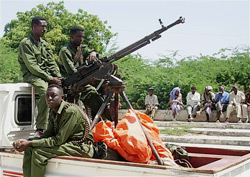On the Issues: Somalia
David Smock is interviewed on Ethiopia's invasion of Somalia, and event that thrusted Somalia back into the international spotlight.
 As part of our first "On the Issues" section, USIP interviewed David Smock, an Institute Africa expert, on Ethiopia’s recent invasion of Somalia.
As part of our first "On the Issues" section, USIP interviewed David Smock, an Institute Africa expert, on Ethiopia’s recent invasion of Somalia.
- Last time most Americans paid attention to Somalia was in 1993, during what came to be known as the Black Hawk Down incident. What has been happening in the country since then?
- Why is Somalia’s social and political structure so fractured? Why is it so seemingly unable to rise above the violent anarchy that has characterized it for so long?
- What prompted Ethiopia to invade Somalia?
- What were Ethiopia's intentions—and did they anticipate what they would do after their military victory?
- What is the U.S. interest in this part of the world—why should Americans care?
- So what will it take to restore order in Somalia?
 Image on right: Armed Ethiopian troops stand guard in Mogadishu, Somalia, on Jan 5, 2007.
Image on right: Armed Ethiopian troops stand guard in Mogadishu, Somalia, on Jan 5, 2007.
(Photo Courtesy AP/Wide World)
Last time most Americans paid attention to Somalia was in 1993, during what came to be known as the Black Hawk Down incident. What has been happening in the country since then?
There is still no central government in place. The North tried to secede, and put in place an effective regional government, albeit one that has not been recognized internationally. As for the rest of the country, the ports and airports were closed, militias competed for space and economic advantage, and a very low level of economic activity was maintained. A year ago, a series of peace negotiations in Nairobi (Kenya) culminated in a peace agreement that called for the formation of a national government. Unfortunately, the people selected to high positions in that government were not widely respected, and the government itself enjoyed so little legitimacy that it had to establish itself in Baidoa, rather than in the capital Mogadishu. At about the same time, an Islamist movement, calling itself the Supreme Islamic Courts Council (or Courts, for short) emerged, calling for the restoration of Sharia law and successfully bringing law and order to Mogadishu. Its success at doing so brought it the support of the business community, and widespread legitimacy among the population.
Why is Somalia’s social and political structure so fractured? Why is it so seemingly unable to rise above the violent anarchy that has characterized it for so long?
That’s a paradox, actually, because Somalis share the same religion and the same language. Unlike many African countries, whose lines were drawn by colonial powers and often included a jumble of ethnic groups, Somalia was ethnically homogeneous. I think what many of us may have failed to appreciate was the depth of the rivalries and conflicts between the various clans and subclans. Even the Courts, for example, are heavily rooted in one of Somalia’s largest clans.
What prompted Ethiopia to invade Somalia?
Soon after it came to power, the Courts became more radical—or rather, some radical elements within the Courts began to assert themselves. The more extreme leaders began to call for the abolition of movie theaters, of qat—the local narcotic leaf that many people chew—and the enforcement of the five-times daily prayers. They also reasserted old Somali claims to parts of Ethiopia and Kenya. Ethiopia became increasingly alarmed by the Courts. They supported the national government in Baidoa, and armed and trained anti-Courts rebels. The Courts, in turn, supported some Ethiopian rebel groups. But no one really believed Ethiopia would follow through on its saber-rattling, because the Courts had the stated support of as many as nine Muslim Arab countries, and the assumption was that it had a competent army. Once the war started on December 24, that assumption collapsed. Ethiopia’s army routed the Courts, killing hundreds and encountering virtually no opposition. Now it is engaged in a mopping-up operation in southern Somalia. But most of the Courts soldiers have simply melted into the population. Now Ethiopia faces a dilemma: if it leaves, the Courts will most likely reestablish itself as the governing force throughout much of Somalia, but at the same time, Ethiopia can’t afford to stay and occupy Somalia.
What were Ethiopia's intentions—and did they anticipate what they would do after their military victory?
I think Ethiopia probably thought they would achieve a swift and decisive victory, that they could eliminate the Courts movement, and that the transitional government in Baidoa would take hold. They probably didn’t anticipate how little legitimacy the transitional government has—and how widely disliked Ethiopia is.
What is the U.S. interest in this part of the world—why should Americans care?
The Ethiopian government has stated that it received encouragement for the invasion from the United States—and the State Department, by not denying this, has acknowledged that it at least tacitly supported the invasion. In fact, U.S. support for Ethiopia’s action appears to have been predicated on a misreading of Somalia’s political culture. The State Department has said that the Courts might be controlled by an al Qaeda cell, although there is little evidence for this. It looked at recent Courts decisions, like banning movie theaters, and saw the Taliban. In doing so, it insufficiently differentiated Islamists from Jihadists—those who want to run their country on Islamic lines from those who see Islam as sanctioning violence against the West. Now, unfortunately, we may have given legitimacy to the hard-liners in the Courts movement, further alienating ordinary Somalis and undermining moderates. If the Ethiopians leave before order is restored, we may leave a legacy of chaos and resentment that is a perfect breeding ground for terrorists—the very outcome we were seeking to avoid. The January 8 attacks by an American gunship reinforce the view, popular in Somalia, that the Ethiopian invasion was really a joint U.S./Ethiopian operation.
So what will it take to restore order in Somalia?
We need a two-prong approach. On the one hand, we need a peacekeeping force of at least eight to ten thousand troops. These would most likely be forces from the African Union, with logistical and financial support from the United States and the European Union. The problem is that it’s not easy to see where these troops might come from. We also need to reach out to moderate elements within Somalia—including within the Courts movement. Somalia needs a coalition government that enjoys internal legitimacy and support.
The views expressed here are not necessarily those of USIP, which does not advocate specific policy positions.



